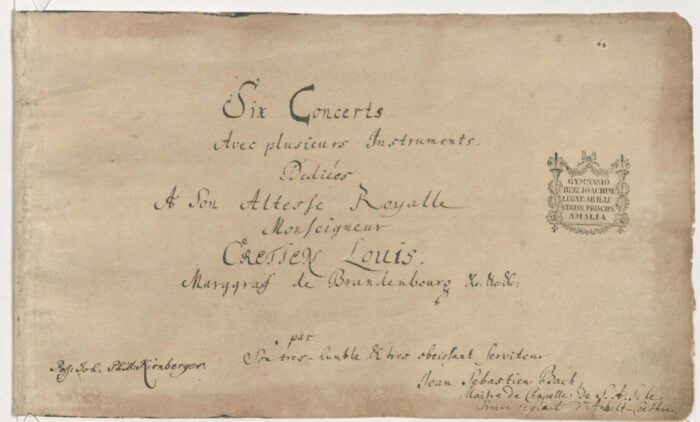The prized Brandenburg Concertos all started as a job application.
Meeting the Margrave
In 1721, Johann Sebastian Bach sent the “Six Concertos for Several Instruments” manuscripts to Christian Ludwig, the Margrave of Brandenburg. Two years prior, the two had met while Bach was on business in Berlin, and the composer — already a celebrated figure in his mid-thirties — was looking for a new job.
But evidence shows the pieces did not come together at once. They were created over the years, and Bach compiled them into a set to try to win his prospective patron.
Impressive though the output was, the Baroque composer may have fallen prey to his own brilliance. Historians believe that the concertos were never performed once they reached the Margrave, whose court ensemble probably did not hold the caliber of musician leaded for the intricate and demanding works.

Title page of the Brandenburg Concertos — or at the time of their completion — "Six Concertos for Several Instruments"
Not only did Bach not land the gig, but the Margrave never acknowledged receipt or gave payment! In time, the pieces lapsed into obscurity.
It was not 1849, nearly a century after Bach’s 1750 death, that the “Six Concertos for Several Instruments” were rediscovered, and the “Brandenburg” moniker was born.
And still, the concertos didn’t reach their current stature until the 20th century, when commercial recordings helped popularize them!
"Several" Is Putting It Lightly
The “Several Instruments” of the original title is key! Bach incorporated different instrumentation into each concerto. He also built upon a wealth of differing musical techniques and influences of the day. Each individual installment has its own remarkable qualities, offering huge interpretive possibilities.
The first concerto rotates between different soloists, not favoring any one instrument, but letting each weigh in. What’s more, it alone boasts four movements — its five counterparts all have the more conventional three movements.
The second is wind-heavy, headlined by recorder (ensembles today often swap in a flute), oboe, and the catalog’s only trumpet appearance. Fourth up is a idiosyncratic mélange of violin and two recorder/flutes. The harpsichord is one of the star players in No. 5 — it shares top billing with the flute and violin. And then a reversal! The sixth and final concerto showcases two violas in place of their more popular, higher-register siblings, the violin.
The third concerto, meanwhile, is one of the most intriguing. The number three is a theme: the work spotlights three violins, three violas, and three cellos. While the entire entry commands attention, it’s the second movement that is the most curious. Bach specified just two chords, opening the floor to a long-form exercise in improvisation. It’s worth checking out multiple interpretations — each ensemble addresses this challenge in a completely different way.
Here's the Chamber Music Society of Lincoln Center's rendition.
Endless Versatility
The Chamber Music Society of Lincoln Center are among the works’ most devoted proponents. They are also among the ensembles that have helped form the concertos into a wintertime tradition. Performing the Brandenburgs, including an annual stop at Chicago’s Harris Theater, is now a fixture of the ensemble’s December calendar; they’re the only works brought back each season.
But like many traditions, some of the finer points evolve year-to-year. Not only does the cast of musicians change, but each year, CMS shuffles the order of the works. Finckel and Wu remark that the individual concertos “sound different with different neighbors.”
But exploring the ensuing differences also underscores that which is fundamental. Irrespective of the works’ order, presentation, artistic personnel, or time of year, The Brandenburgs are a warm embodiment of artistic ingenuity and harmonic collaboration.
The Chamber Music Society of Lincoln Center performs the Brandenburg Concertos each December and will share all six at the Harris Theater on December 13, 2023. To hear CMS year round, catch the weekly Chamber Music Society of Lincoln Center on Tuesday evenings on WFMT.
